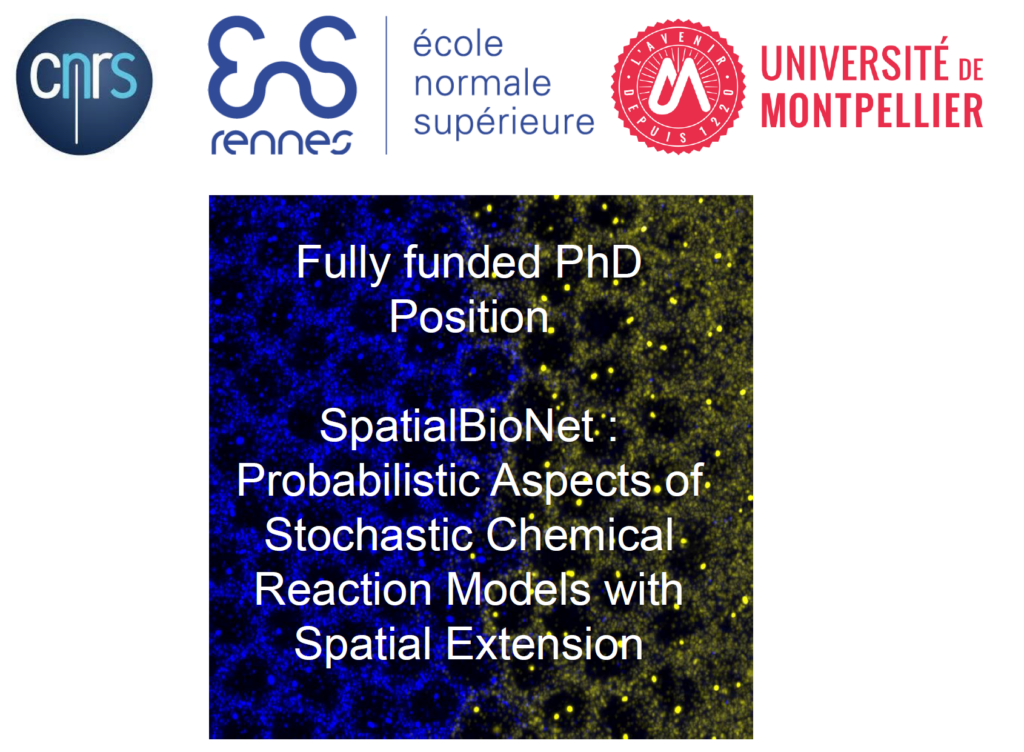
We are looking for prominent candidates for a PhD thesis within the CNRS MITI 80 Prime project SpatialBioNet, a collaboration with Arnaud Debussche ENS Rennes and Mounia Lagha IGMM
Introduction: Stochastic chemical reaction network models are crucial for understanding the dynamics of biological systems where randomness plays a central role. Integrating spatial extension into these models adds complexity and allows for the exploration of probabilistic behaviors in realistic biological contexts. This thesis aims to investigate probabilistic aspects of stochastic chemical reaction network models with spatial extension. The basic objects are described by jump processes and Piecewise Deterministic Markov Processes. The aim is to prove limit theorems in the context of multiscaling. One of the applications is the development of the Drosophila embryo.
Objectives:
- Model Development: Develop and analyze stochastic chemical reaction network models with spatial extension using Markov jump processes. Explore how spatial factors influence reaction kinetics and system dynamics across different scales.
- Limit Theorems and Asymptotic Analysis: Investigate limit theorems for stochastic chemical reaction networks with spatial extension, considering hybrid, piecewise deterministic limits. Analyze the asymptotic behaviors under various scaling regimes and timescales.
- Hybrid, Piecewise Deterministic Limits: Study the dynamics of stochastic models with hybrid, piecewise deterministic limits. Examine how these limits capture transitions between stochastic and deterministic behaviors in spatially extended systems.
- Multiple Scaling and Multiple-Timescale Dynamics: Explore multiple scaling and multiple-timescale dynamics in stochastic chemical reaction networks with spatial extension. Analyze how interactions between fast and slow processes influence system stability and emergent properties.
Methodology: In this work, we will develop mathematical frameworks, such as stochastic differential equations and master (or Kolmogorov) equations, to model spatially extended chemical reaction networks. Our aim is derive limit theorems and characterize system behaviors using probabilistic and PDE methods.
Interdisciplinary Nature: This project is interdisciplinary, bridging concepts from mathematics, and biology. It applies probabilistic modeling and spatial dynamics to biological systems, particularly focusing on the development of Drosophila embryo. By integrating biological applications, this research aims to advance our understanding of stochastic processes in developmental biology.
Summary: This thesis aims to advance our understanding of probabilistic aspects in stochastic chemical reaction network models with spatial extension, with significant applications to biological systems like the development of Drosophila embryo. By integrating concepts of Markov jump processes, hybrid, piecewise deterministic limits, multiple scaling, and multiple-timescale dynamics, this research aims to uncover fundamental principles governing stochastic dynamics in spatially structured biological systems.
References:
- A Debussche, MJN Nankep, A Piecewise Deterministic Limit for a Multiscale Stochastic Spatial Gene Network, Applied Mathematics & Optimization (2021) 84: 1731-1767.
- A.Crudu, A.Debussche, A.Muller, O.Radulescu, Convergence of stochastic gene networks to hybrid piecewise deterministic processes, Annals of Applied Probability (2012) 22: 1822-1859.
- A.Crudu, A.Debussche, O.Radulescu, Hybrid stochastic simplifications for multiscale gene networks, BMC Systems Biology (2009) 3:89.
- Pimmett, V. L. et al. Quantitative imaging of transcription in living Drosophila embryos reveals the impact of core promoter motifs on promoter state dynamics. Nat Commun 12, 4504 (2021).
How to apply: Upload motivation letter + CV + transcripts + names of 2 referees to the CNRS website, project SpatialBioNet, before Aug 15 2024.